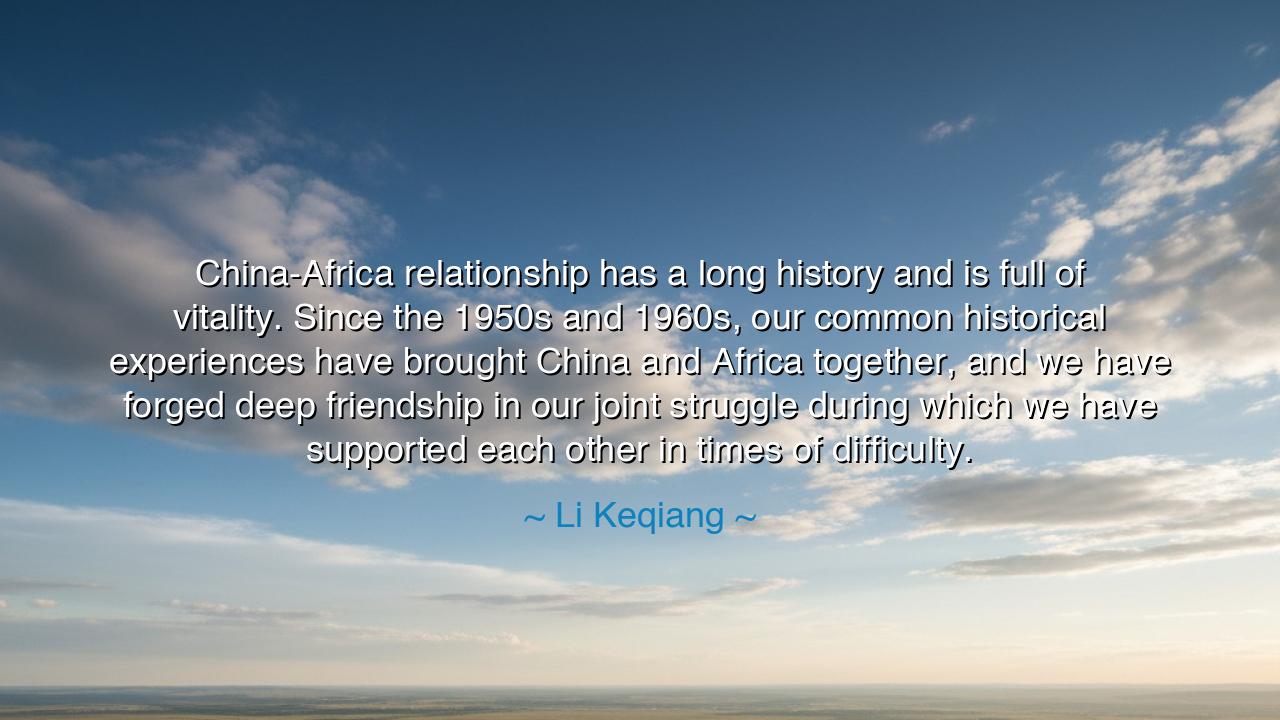
China-Africa relationship has a long history and is full of
China-Africa relationship has a long history and is full of vitality. Since the 1950s and 1960s, our common historical experiences have brought China and Africa together, and we have forged deep friendship in our joint struggle during which we have supported each other in times of difficulty.






In the timeless stories of the ancients, we find that the bonds between peoples are often forged in the fires of struggle, shared adversity, and mutual respect. These bonds transcend the mere passage of time, creating deep and lasting connections that resonate through the ages. Li Keqiang, the esteemed leader of China, speaks of such a bond when he says: "The China-Africa relationship has a long history and is full of vitality. Since the 1950s and 1960s, our common historical experiences have brought China and Africa together, and we have forged deep friendship in our joint struggle during which we have supported each other in times of difficulty." In these words, we hear the call of history, the power of shared experience, and the strength that arises from standing together in the face of great challenges.
The relationship between China and Africa is not a fleeting alliance, but one that has been nurtured over generations. The ancient peoples knew that true alliances were not built on superficial agreements but on the foundation of mutual experience, on the recognition that the struggles of one were the struggles of all. This bond began to take shape in the 1950s and 1960s, when China and Africa found themselves united by a shared history of colonialism, oppression, and the fight for freedom. In the face of foreign domination, both China and Africa sought to break free from the chains that held them down, forging a deep connection through their common struggle for sovereignty and self-determination. Li Keqiang’s words remind us that the relationship between these two regions is rooted in solidarity, a friendship built in the crucible of shared hardship.
Consider the ancient tale of Cyrus the Great and the Persian Empire, who united many tribes under a common cause. Cyrus understood that a lasting and strong empire was not built on the subjugation of others, but on the unity of common peoples through respect and shared purpose. Much like China and Africa in the mid-20th century, the peoples of Cyrus's empire were brought together not by the promise of power, but by the understanding that their freedom and prosperity were linked. China and Africa were not mere political entities; they were united by the deeply human desire for freedom and the profound understanding that together they could overcome the external forces that sought to divide and conquer them.
The shared historical experiences of China and Africa are not limited to the past. They extend to the present, as both regions continue to face modern challenges that are best met through cooperation and solidarity. Whether it is in the fight against poverty, the promotion of sustainable development, or the strengthening of cultural ties, China and Africa remain united in their efforts. These bonds are not born from charity or self-interest, but from the deep-rooted understanding that the success of one is tied to the success of the other. Li Keqiang’s words echo this sentiment: the relationship between China and Africa is one of vitality—a partnership that continues to grow stronger with time, rooted in a common desire for prosperity and progress.
The lesson in Li Keqiang’s statement is one of unity and mutual support. In a world where differences often divide us, China and Africa have demonstrated that solidarity in the face of adversity is the path to strength. The relationship between these two regions teaches us that even in times of difficulty, true friendship is found not in moments of ease, but in the willingness to stand together and offer support when it is needed most. This is the wisdom of the ancients: strength is found in unity, and it is through shared struggle and mutual respect that true bonds are formed.
In our own lives, we must seek to build such alliances—not out of mere convenience or self-interest, but out of the recognition that our success is bound to the success of others. Whether in families, communities, or nations, our shared experiences, our common struggles, and our ability to support one another in times of need are what will define the strength of our relationships. Let us take the example of China and Africa to heart, and in our own lives, strive for mutual respect, cooperation, and solidarity, knowing that when we stand together, we are stronger than we are apart.
Thus, we are called to remember the enduring wisdom of Li Keqiang: history has taught us that friendship and cooperation are the greatest forces for peace and prosperity. Just as China and Africa have forged a bond of solidarity and mutual support, so too should we seek to build relationships that transcend the boundaries of difference, rooted in the understanding that the struggles of one are the struggles of all. In these friendships, we find the true strength of the human spirit—resilient, united, and always looking forward to a better future.






AAdministratorAdministrator
Welcome, honored guests. Please leave a comment, we will respond soon